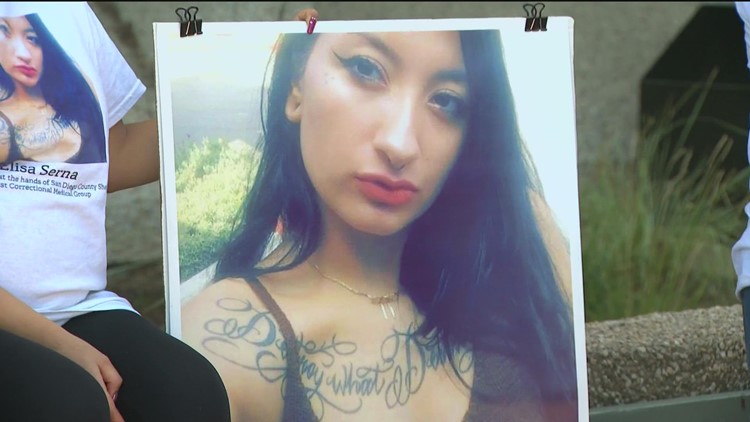EL CAJON, Calif. — An El Cajon jury began deliberating Tuesday in the trial of a doctor and nurse charged with involuntary manslaughter for allegedly failing to care for a woman whose health rapidly declined while in jail, leading to her death.
Friederike Von Lintig, 59, and Danalee Pascua, 39, are charged in the Nov. 11, 2019, death of Elisa Serna at the Las Colinas Detention Facility in Santee.
Von Lintig was the physician on duty on the day Serna died, while Pascua was the last nurse to see Serna just before her death. They each face up to four years in state prison if convicted in what is a rare case of criminal charges brought against medical providers in connection with an inmate's death.
The high rate of deaths at San Diego County jails has drawn criticism and scrutiny from the public and officials, with the California State Auditor publishing a scathing report in 2022 that stated the San Diego County Sheriff's Department's policies and practices regarding inmate care were deficient. Serna's family is also among many others that have sued the county in connection with a loved one's in-custody death.
Serna, 24, died from what a county medical examiner determined was complications of chronic polysubstance abuse with a contributing factor of early intrauterine pregnancy. She was pronounced dead shortly after she collapsed in her cell in the jail's medical observation unit.
During closing arguments in a trial that began more than two weeks ago, Deputy District Attorney John Dunlap told jurors Von Lintig and Pascua were criminally negligent in their care of a woman whose condition was severe, yet could have been treated.
Prosecutors allege Serna was exhibiting obvious symptoms of withdrawal from alcohol and drugs, which included frequent vomiting and around a dozen seizures in the final 24 hours of her life.
Those symptoms warranted a higher level of care, according to prosecutors, who alleged Serna's condition was at times ignored. On other occasions, she was accused of faking seizure-like activity and fainting spells that caused her to repeatedly fall down in her cell.
Defense attorneys for both Von Lintig and Pascua argued their clients were being scrutinized with the benefit of hindsight and that both were operating with information provided to them by others at the jail.
In the early afternoon of Nov. 11, Von Lintig and others responded to Serna's cell after she began exhibiting seizure-like symptoms while in a wheelchair.
Dunlap alleged that after examining Serna, Von Lintig "did next to nothing" in terms of treating her, other than order that Serna to remain under observation in the medical observation unit, rather than go back to the jail's general population.
Hours later, Serna suffered another seizure that led nurses to call for Von Lintig's assistance, Dunlap said. But the doctor never responded to Serna's cell and instead left the jail for the day as her shift came to a close.
A few hours later, Serna "had one last hope" for adequate treatment in the form of Pascua, the prosecutor said.
The nurse attempted to take Serna's vital signs in her cell, but Serna collapsed, struck her head against the wall, and began experiencing yet another seizure.
Dunlap alleged Pascua didn't finish taking Serna's vital signs after her collapse.
Instead, he said, she left the cell and sat at a nursing station situated a few feet away for the next hour, during which time Serna lay on the floor with her head slumped forward and propped up against the wall, and urinated herself.
Pascua later noticed Serna was pale and didn't appear to be breathing, at which point emergency medical personnel were summoned. She was pronounced dead shortly thereafter.
"They did not treat her and she died as a result," Dunlap said. "Elisa Serna's time at the Las Colinas Detention Facility did not have to be a death sentence."
Von Lintig's attorney, Dana Grimes, told jurors her client was very concerned about Serna's condition and that if she didn't care, she would not have ordered that Serna be kept under observation.
The attorney noted that none of the other medical professionals who saw Serna described her symptoms as seizures and that on Nov. 11, Von Lintig was working with an incomplete picture of Serna's condition. Grimes said Von Lintig never witnessed any of Serna's seizure symptoms or instances of vomiting.
She also said that the nurses who called for Von Lintig late that afternoon did not communicate that it was anything approaching an emergency.
The trial included differing accounts of Von Lintig's response to being summoned to Serna's cell, with one deputy saying Von Lintig claimed Serna was faking her symptoms. Other accounts imply Von Lintig was uncertain what was wanted of her.
Grimes said that if Von Lintig was aware of the seriousness of the situation, she "would have rushed over" to see Serna.
Pascua's defense attorney, Alicia Freeze, said her client did not cause Serna's death and that according to testimony from medical experts, Serna's position lying against the wall did not play a role.
Freeze argued Pascua did not directly witness Serna's fall and from her vantage point, it appeared Serna was slowly sliding down the cell's wall into a sitting position.
As with Von Lintig, Freeze said Pascua was not privy at the time to video evidence that would have shown her that Serna was experiencing seizures and numerous falls.
While Von Lintig and Pascua are the only people charged among the medical professionals and sheriff's deputies who encountered Serna in her final days, Dunlap acknowledged that jurors may feel that others might be responsible or that there were "many failures" among those entrusted with Serna's care.
"No one deserves any awards for their conduct in this case," Dunlap said.
A trial brief filed by the prosecution states that several other people, many of whom were witnesses who testified during the trial, were also responsible for Serna's care, but their testimony wouldn't open them up to criminal liability.
According to the brief, "The most serious applicable charge in regard to Ms. Serna's death is involuntary manslaughter ... a crime for which the statute of limitations has expired."
WATCH RELATED: Trial begins for doctor and nurse charged in Las Colinas in-custody death



